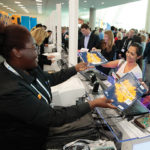It’s a question that Harald Bathelt — a professor of economic geography in the political science department at the University of Toronto — first became interested in more than a decade ago, as a professor at Germany’s University of Frankfurt.
Bathelt visited two triennial events at Messe Frankfurt — huge trade shows where global communities met to show off their innovations. “One was a trade show on the global lighting industry — a really fascinating event with all sorts of design- and technology-related exhibits,” he said. The other, although just as important for the industry it represented, wasn’t so personally engaging. It featured slaughtering and sausage-making machines.
But what really piqued Bathelt’s interest — and fueled his subsequent research — was the fact that both shows weren’t just sales marketplaces, but places where participants were engaged in interactive learning. Sales were still prominent, but Bathelt also observed a steady flow of information in all directions, between customers, competitors, suppliers, and others.
The trade show was functioning as much as a knowledge marketplace as a sales marketplace, observed Bathelt, whose research specialties include industrial clusters and economic development. Last year, Bathelt published his research about the role of trade shows in knowledge transfer in Trade Shows in the Globalizing Knowledge Economy, which he co-wrote with Bocconi University’s Francesca Golfetto and Kedge Business School’s Diego Rinallo.
“In the knowledge economy, competitiveness crucially depends on the knowledge resources of firms,” the authors write. “Trade shows, especially international ‘flagship fairs’ or hub shows, play a decisive role in this respect, establishing critical links between individuals around the globe for discussions about the learning or knowledge economy in a global context.”
Trade-show critics say, “‘We have the Internet, so the trade shows are disappearing,’” Bathelt said. But “we always see changes — trade shows come and go, some are shrinking, some are increasing. Some are closed, and new ones appear all the time. In Asia, there is a tremendous growth. And the big events are growing.
“If you look at these large events, the major events in an industry, this is where the world comes together for a few days,” Bathelt said. “This is where you can get to know everything about your industry. Whatever trends are going on, this is the place where you get this information.”
As an expert on economic clusters — concentrations of business and academic expertise that gain strength through proximity to one another — Balthelt has observed that knowledge spreads at trade fairs in the same way as in more permanent clusters.
“There is a buzz of knowledge that flows back and forth,” Bathelt said. “There is horizontal interaction between competitors, even if it is just observing and monitoring your competitors, and scanning their exhibits. Sometimes there is not a competitive situation at the trade show at that time, so there is actually quite a bit of conversation between firms that are usually competitive.”
Bathelt’s future research will look at the ways trade shows can collaborate with informal communities, specifically around the gaming industry in Toronto and Montreal. Montreal, he said, “has really developed into one of the leading spots, because it is connecting the industry itself.”
Many programmers in the industry are themselves gamers, and are innovating in gaming communities outside of work. “On the one hand, you have the formal organizations — firms and research institutes and associations,” Bathelt said. “On the other hand, you have these communities that you could call the underground of the gaming world.” Bringing them together can enhance innovation. “If they are organized in the right way,” Bathelt said, “and if you can attract the right crowds, firms, players in the industry and from the field, they can be hugely important.”



